- Home
- Abigail Roux
According to Hoyle Page 2
According to Hoyle Read online
Page 2
Baird gripped the table in front of him, gaping up at the chandeliers and the plaster molds on the ceiling as they began to flake and fall around them.
“Earthquake!” someone shouted, this newer, more unusual threat overriding that of the guns.
Baird looked back at the two combatants and stood when he saw Rose had disappeared. A large piece of plaster landed in the middle of their table, and Baird ducked away from it. Stringer had hit his knees and was covering his head, oblivious to anything but the danger of the falling debris. They both dove for the table and huddled under it.
Several minutes later, the trembling finally stopped. Baird climbed to his feet. His eyes searched around the dining room, and he gritted his teeth.
“Damn the man.”
“You want to go after him?” Stringer asked unenthusiastically as he holstered his gun.
Baird shook his head. “He can’t hurt us.”
“You mean he can’t hurt you.”
Baird eyed him sharply. “If you want to go running through the rubble of Denver to find him, then be my guest. Just be aware he’s expecting you now. He won’t be quite so easy to kill.”
Stringer’s full lips curved into a wicked, frightening smile. “Another time, then.”
Baird shivered despite himself. At least he knew he had the right man for the job. The information he’d needed from Rose could be acquired in other ways. Harder ways.
December 1882
Lincoln, Nebraska
Deputy US Marshal Eli Flynn’s boots echoed on the wooden sidewalk as he trudged the last few steps of his trip. He hardly recognized this section of the town; most of the structures had been rebuilt after the fire burnt them all to the ground. When he’d left, this area had been merely foundations and frames. Or rubble.
Lincoln, Nebraska, had grown in leaps and bounds the last several years, trying to become what the residents expected from the capital of a newly formed state. The buildings rose two and sometimes three stories, making the streets feel closed in and dark. Flynn didn’t like it. But the Marshal Office remained on the outskirts of town, where the breeze could still reach him and the sun still shone down to warm the cold mornings.
He stopped at the shining new window to the dry-goods store, intending to straighten up a little, to at least seem respectable when he went in. But one look told him it was no use. He was dirty and haggard, and his normally well-manicured goatee was bordering on the wrong side of woolly. But an hour at the bathhouse would fix all that right up too.
He turned away and headed for the Marshal Office. He had to check in before he could even think about trying to remedy any of it, though. It wasn’t as if being dirty and tired were unusual west of the Mississippi. Nor was it unexpected after a trip like the one he had taken.
He stopped at the door to the new Marshal Office and wiped his face with his kerchief, took his hat off and swiped at his forehead and eyes, then stuffed the bit of red material back into the pocket beneath his frock coat. He squared his sore shoulders and took a deep breath before strolling into the building that still smelled of fresh pine.
A bell hanging above the door dinged as he walked in. He glanced up at it curiously. The tiny brass bell was just as new as the rest of the construction. A bell there made sense, though. A marshal should have a way of knowing when someone walked in.
The sounds of the bustling street outside reached through the walls of the Marshal Office: horses’ hooves clopping along the packed-dirt street, ladies’ boots clacking against the raised walkways, men calling greetings to one another in the early-morning cold. It was a comfortable, familiar scene. One that Flynn had missed.
The office, however, was anything but familiar. Flynn looked around at the bright, whitewashed walls and the pristine pine floors. The old office had been sparse and dreary, with scuffed floors, no windows, and very little light. He and Wash had seen fit to fix that when they’d rebuilt. The cells, rather than being all in one room like before, were out of sight in the back of the structure.
Flynn removed his hat and held it at his side, not wanting to knock the dust off his clothing in the clean room.
“Flynn?” The voice boomed from the rear of the building.
Flynn peered into the dim, his eyesight still ruined from the bright morning sun outside.
Deputy US Marshal William Henry Washington, or Wash to friends and strangers alike, emerged from the back of the office, into the light, and surveyed Flynn with sharp, clear green eyes. His sandy hair was shorter than it had been the last time Flynn had seen him. His beard and mustache were gone, with only the sideburns near his ears still present. And for the first time in Flynn couldn’t remember how long, Wash wasn’t wearing his guns.
“You look like hell,” Wash observed with a grin.
“Stillwater to Lincoln is a long trip.” Flynn shook the hand Wash offered.
“But it’s easier on the return.”
Flynn smiled weakly and nodded. Transporting prisoners was never a simple task. Stillwater was one of the better transits because nearly every stop offered a decent place to lock someone up or otherwise restrain them with a minimum of fuss. Other locales weren’t so convenient, like when you had to tie your prisoner to a telegraph pole just to get a decent hour or two of sleep. The solo return, of course, was always less stressing.
“Sense of humor is still top notch, I notice,” Wash said. He turned away and headed for the desk against the far wall. He picked up a small yellow piece of paper and waved it in the air. “I’ve got another one for you.”
Flynn narrowed his eyes at the telegram with a sinking sensation in his gut.
“They’re waiting to be picked up in Junction City,” Wash continued as he glanced at Flynn, looking over Flynn’s tired face and slumping shoulders. “You ready for another one? I might can give this to someone else . . . Actually, I can’t give it to no one else ’cause no one else is around, but I can offer and pretend I care that you’re about to yell.”
Flynn merely glared at him.
“It’s an easy one,” Wash offered in a voice that was probably meant to be enticing.
“The last ‘easy’ one you gave me tried to kill me,” Flynn reminded him. “Twice.”
“They’re outlaws, Flynn. By and large, that’s what they do.” Wash walked around the desk and held the telegraphed message out to him with a whistle.
“Is this one going to the gallows?” Flynn sighed as he reached for the paper. Prisoners going to their execution always gave the US Marshals escorting them one hell of a hard time. They were fighting for their lives, after all, and more lawmen were killed while transporting prisoners than any other activity they performed. Neither Flynn nor Wash had ever had a prisoner escape on them, though. Not one that they hadn’t recovered almost immediately, anyway. Or shot dead during their escape attempt.
“No gallows. There are three in the group you’re picking up,” Wash told Flynn. “Two are heading to Fort Smith, some sort of military to-do, but you’re only taking them as far as St. Louis to meet up with the Army escort. The last is going to trial in New Orleans. You’ll have to—”
“Three?” Flynn blurted. “This is an easy one? Goddamn, Wash!”
“Taking the Lord’s name in vain, Flynn.” Wash smirked. “I’m shocked. What would the lady folk say?”
“You ain’t no damn lady. And I can’t escort three men by myself. Who’s going with me to ride herd?”
“You want someone to go with you?” Wash feigned surprise.
Flynn smacked his hat against his jeans and sent a puff of dust swirling into the clean office.
Wash just chuckled and held up his hand. “I’m going with you as far as St. Louis,” he said, still laughing. “Then I’m to head to Natchez to convene with the governor, and I’ll meet up with you again in New Orleans for the return home.”
“You?”
Wash shrugged and nodded. Flynn’s attention strayed to the crisp linen sling that hung over Wash’s shoulder, supportin
g his left arm, and then back to the man’s eyes in question.
“I can draw a gun with one hand,” Wash assured him quietly, suddenly serious as he sat on the edge of the desk.
“You can’t restrain a prisoner with one hand,” Flynn argued. “You can’t chain and unchain them with one hand. You can’t expect them to see you as a serious authority figure or anything of a threat with one hand.” He waved his hat at Wash’s shoulder. “They’ll be trying to escape left and right.”
“Then I’ll be sure to let them know,” Wash responded with his customary calm, “that since I can’t chain them or restrain them peaceably, I’ll just have to shoot them if they cause problems. Will that satisfy you?”
Flynn pursed his lips and blew air heavily through his nose. He didn’t want to insult Wash or hurt him, but he also didn’t want to be stampeded by a herd of escaping prisoners. “Can you use it at all yet?” he asked, already regretting his criticism. It was bad enough being injured. It was worse seeing that people didn’t have much confidence in you, especially for a man like Wash, who had always been so capable.
Wash flexed his fingers against his chest. He tapped his silver badge and smiled crookedly. That was more movement than he had been up to when Flynn had left for Stillwater Prison three weeks ago. But Flynn struggled to keep even a hint of sadness out of his expression as he watched. Would his friend ever get the full use of the arm back?
Wash obviously read him like an open book. He flicked his wrist, producing a derringer attached to a gambler’s gauntlet out of the end of the sling.
Flynn blinked in surprise, his body instinctively twitching to reach for his own Colt. He laughed and offered Wash a fond shake of his head.
“You crazy bastard.You’re going to get yourself shot.”
“Hell, I already done that,” Wash said. “And you might find me taking exception to such talk.” He turned away, going to the potbelly stove in the far corner and retrieving a tin tray of food that had been warming nearby.
Flynn remained where he was. They’d spent plenty of years together, battled Confederates and Indians together, and become US Marshals together when they’d run out of wars to fight. But since Wash had been forced to take over the Lincoln Marshal Office a year ago due to the untimely death of their superior, Flynn had seen little of him other than the occasional drink or their nightly dinner at the saloon, and that just wasn’t the same. It would be welcome, actually, to be able to travel with Wash again and spend some time with him.
“When do we leave?” he asked as Wash retreated into the row of cells with the tray of food.
“After supper. Best you get a bath and some rest,” Wash answered over his shoulder.
Flynn hummed. He had slept on the train from Stillwater, and though the thought of a nice soak was highly appealing, he didn’t feel like leaving just yet. Escorting prisoners was a lonely task. They weren’t much for conversation, and neither was Flynn when criminals and horses were the only things around to talk to.
“When’d they get this finished?” he asked, following Wash back into the darker recesses of the office.
“Last week,” Wash answered. “The design we laid out worked perfect.”
And one of the newly minted cells was already occupied.
“Who’s this?” Flynn asked with a wave of his hat at the man who lay curled on the hard cot within.
“What, you don’t recognize Larry Fitz?”
Flynn’s lips parted in shock. The man’s clothes were thin and tattered, and he was covered in caked mud and blood. His hair was stringy and his face was sunken. Flynn had seen a man dragged by a horse who had looked something like Larry did now. “What happened to him?”
Wash’s answer was grim. “He got caught.”
Flynn glanced at Wash and saw the familiar hard set of his jaw and the glint in his green eyes. The expression told Flynn that the man inside the cell was lucky to be alive. Larry Fitz, who lay bruised and battered and barely recognizable, was essentially a harmless drunkard. Or he had been, until the night two months ago when he’d gone on a bender and decided to set fire to the Feed and Seed, the building that had shared a wall with the old Marshal Office.
Wash had been inside the jail that night, and he had nearly lost his life trying to release the prisoners from their cells as the building burned down around them. His hands still bore scars from the burns he’d received from the heated metal of the bars as he’d opened the doors. The fire had leaped from the building that housed the General Store and Feed and Seed and the jail beside it, to the buildings on either side of them: the stables and the saloon.
The horses had all been saved, which was a stroke of luck considering their value in a town like Lincoln, but the buildings had burned down like the dry kindling they were, and with them went the livelihood of some of the town’s most prominent citizens. The biggest tragedy had been the deaths of three guests renting the rooms above the saloon who hadn’t been able to get out in time. The damage to the town and to its reputation hadn’t made anyone particularly happy.
The prisoners Wash had risked his life to save had promptly tried to escape as the townsfolk dealt with the spreading fire. That was how Wash’s arm wound up in the sling. A bullet from a stolen gun had taken him cleanly through the shoulder as he’d tried to retake the prisoners without violence. Of course, after being shot, violence had not been one of Wash’s concerns and the escaped prisoners hadn’t made it very far.
The doc was certain he would make a nearly full recovery. Flynn, however, was certain that the doc spent too much time in the saloon, and so he worried for Wash and his arm.
The two prisoners who had attempted to escape that night now occupied permanent spots up in the shady little grove of headstones the local residents had naïvely named God’s Acre, thinking an acre would be enough to hold the dead in a town west of the Mississippi.
Fitz, the man who’d caused the whole damn mess, had gone to ground as soon as he had sobered up and realized what he’d done, and he’d been in hiding ever since. Until now, apparently.
“Who found him?” Flynn asked softly.
“Cyrus Beeson, over on the flats,” Wash answered. “It’s a damn miracle they didn’t kill him ’fore I got to him. Just happenstance I was anywhere near when they dragged him in. They were heading for a hanging tree, making a damn mess of it.”
“Shame you got to him at all,” Flynn muttered.
“Law don’t work that way, Flynn.”
“It does out here.”
“It ain’t supposed to.” Wash slid his key into the lock and turned it slowly. The man inside didn’t move as the hinges groaned. Wash knelt and placed the tray of food on the floor.
“Maybe it should,” Flynn argued quietly. “It’d make our lives a lot easier.”
Wash eased his way back out of the cell and retrieved his key, locking it and watching to see if Larry would move. When it didn’t appear that he would, Wash pursed his lips and turned to Flynn.
“Life’s not easy to come by. I don’t mind mine being hard, and I don’t take it lightly when I’m forced to take one. You shouldn’t neither.”
“I ain’t the one deciding to waste my life by stepping outside the law.”
Wash brushed by him and headed back out into the front office. Flynn followed him.
“Even outlaws got their stories, Eli,” Wash told him.
“And they can tell ’em to the Devil when they see him,” Flynn insisted.
Wash sighed as he sat himself in front of the stove and propped his booted feet on the bench in front of him. “Go get yourself a bath, Marshal Flynn,” he suggested with a resigned smile, obviously recognizing the argument as just as hopeless as it had been the last time. “I’ve ridden horses that smelled better’n you.”
Nebraska Badlands
A bitter wind whipped through the cottonwoods along the Rosebud Creek. Snow flurries rode the gusts, falling erratically amidst the soldiers from nearby Fort Robinson who labored in the cold. Th
eir breaths were visible in the frosty air even from the ridges that rose above the river. The soldiers were being pushed hard, picking through the rocks that lined the river and piling them carefully into large crates. Some of the rocks contained what appeared to be skeletons; outlines of bones that looked like animals no one had ever seen, trapped inside rocks with no explanation for how they’d gotten there. The soldiers tossed some of these rocks into stenciled crates along with the rest.
Another band of soldiers worked atop one of the high hills above the river, searching the ground for something long buried and digging random holes to find and recover it.
Bartholomew Stringer knelt amidst the scrub ponderosa pine atop the edge of a low butte, his dark eyes narrowed under the brim of his hat. His second-in-command hunched beside him, the man’s reedy shoulders bent against the brisk wind that howled down from the Black Hills to the north, into and across the badlands.
“You sure ’bout all this, Cap?” Frank Alvarado muttered as they watched. He was thin and twitchy. His stringy blond hair hung lank around his narrow face, and his deep-set eyes were a pale blue that made him seem weak and sickly. He was anything but. His weedy appearance worked to his advantage more often than not.
Stringer glanced at him. He wasn’t used to having his orders questioned. But this was not a normal excursion, so he was giving his band of half a dozen men some leeway. They had traveled all the way from Texas, and most of them had never been somewhere this damn cold. Back home they were known as the Border Scouts, a name retained from ties to the sharpshooters and rogue bands of the now-defunct Confederate Army because of the fear it instilled in those who heard it. Here, they were nothing but another gang of men with guns. It had been a lot to ask of them to give up that esteem and comfort without telling them why they were here.
Stringer’s patience with their doubts was reaching an end, though. He was taller than most and wide along the shoulders. His deep voice was often enough to keep order amidst the ruffians who called him Cap, but his size and his piercing gaze helped to remind them just how cruel he could be when they got unruly. It wasn’t often he had to resort to actively keeping his men in line.

 Cross & Crown
Cross & Crown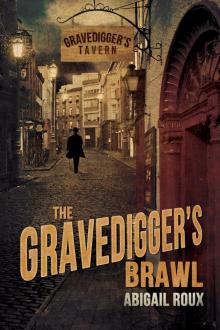 The Gravedigger's Brawl
The Gravedigger's Brawl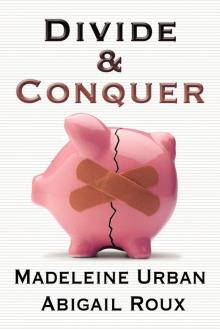 Divide & Conquer
Divide & Conquer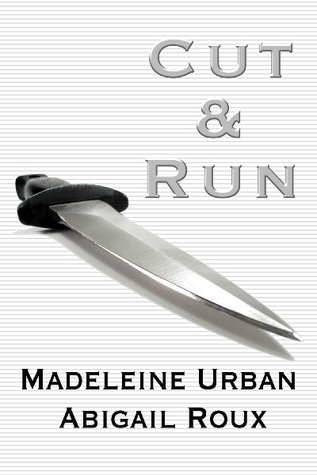 Cut & Run
Cut & Run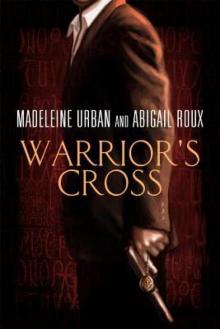 Warrior's Cross
Warrior's Cross Sticks & Stones
Sticks & Stones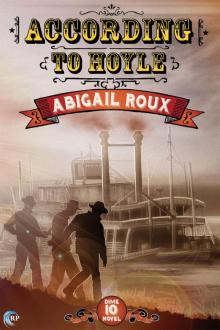 According to Hoyle
According to Hoyle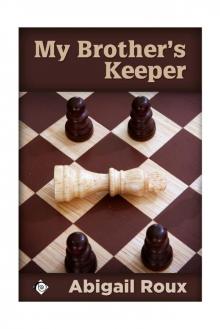 My Brother's Keeper
My Brother's Keeper Crash & Burn
Crash & Burn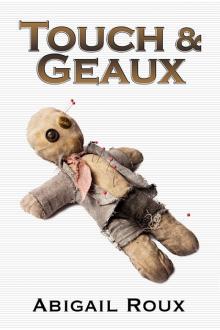 Touch & Geaux
Touch & Geaux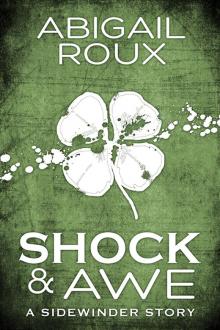 Shock & Awe
Shock & Awe Ball & Chain
Ball & Chain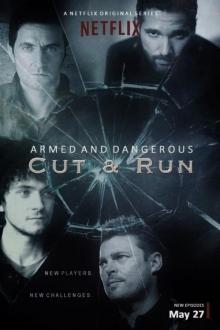 Armed & Dangerous
Armed & Dangerous Stars & Stripes
Stars & Stripes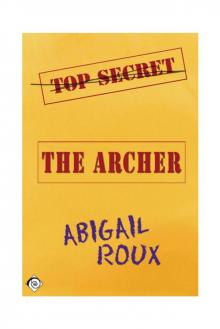 The Archer
The Archer Unrequited
Unrequited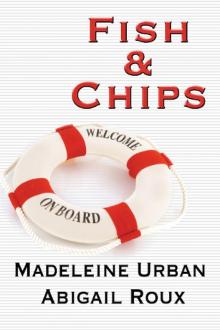 Fish & Chips
Fish & Chips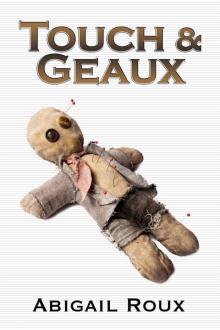 Touch & Geaux (Cut & Run, #7)
Touch & Geaux (Cut & Run, #7) Crash & Burn (Cut & Run Book 9)
Crash & Burn (Cut & Run Book 9) Shock & Awe (A Sidewinder Story)
Shock & Awe (A Sidewinder Story)